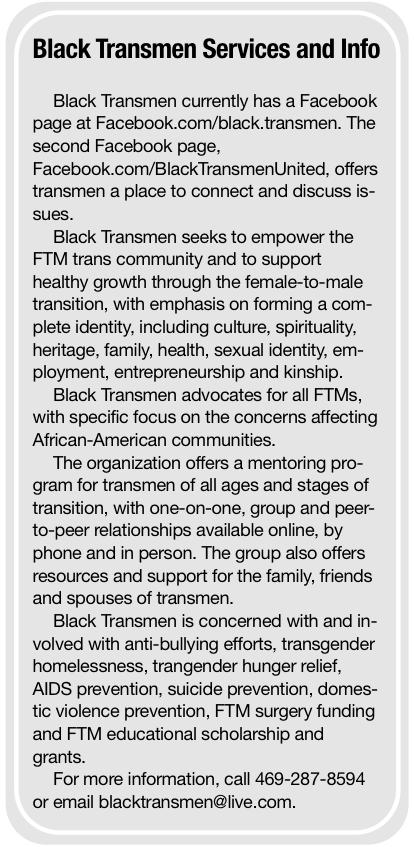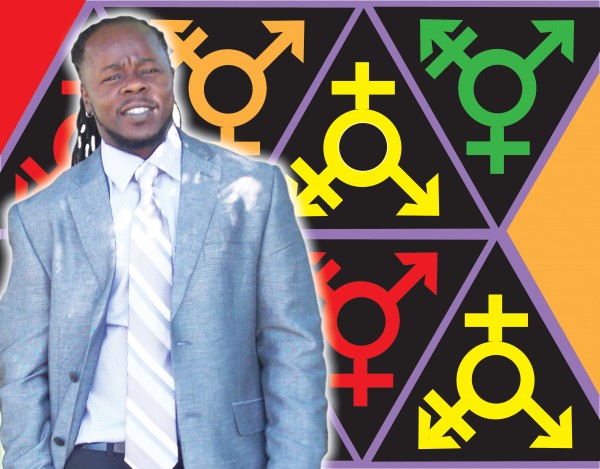Carter Brown knew from personal experience that African-American transmen are among the most invisible and most under-served people in the LGBT community. So he founded a new organization in hopes of filling in the gaps
TAMMYE NASH | Senior Editor
nash@dallasvoice.com
Transitioning is never an easy process for anyone, but African-American female-to-male trans people face some special challenges, according to transman Carter Brown.
“Our lives, the path we feel we have to take is a challenge. We are voluntarily accepting the role of Public Enemy No. 1: The black man is the most feared man in America,” Brown said. “When we transition from female to male, we are accepting all the challenges that black men in this country face, from society, from our families and from ourselves. It’s a lot to bear.”
And Brown noticed early on in his own transition process that black transmen, in many instances, had to face those challenges alone. That’s why he decided to launch an organization focusing primarily on helping others like himself.
That’s when Black Transmen was born.
Brown said that, having been born biologically female, he knew from a young age that he was different. As a teenager, he came out as a lesbian and “found a place in the community as a butch lesbian.”
But still, something was missing: “I still didn’t feel complete,” he said.
Then one day, when he was 24, Brown was watching TV and saw a talk show that included a transman as a guest.
“It just turned a light on for me,” he said. “Finally the pieces started to fall into place.”
So he started going to the library, using the computers there to look for information and resources that could help in his quest to transition. He found some resources and made connections with other transmen in Yahoo groups. But few of those resources addressed the special challenges of black transmen, and few of those new friends were transmen of color. They couldn’t relate, Brown said, to the special challenges black transmen face.
“I couldn’t find people who were like me. That’s why I decided to start this organization, to reach people like me and move us forward.”
Brown said he started out by creating a page on Facebook, and he was amazed at how many people were drawn to it. The more comprehensive organization grew out of that Facebook page, and today, Brown said, Black Transmen has about 300 members nationwide and is led by a three-member board consisting of Brown and two other transmen that he chose not to name out of respect for their privacy.
Brown said he and the organization’s other leaders have worked to create a structure with programs and outreach designed to address the needs of transmen in general as well as the specific challenges that transmen of color face.
One of the greatest challenges for black transmen, Brown said, is financial, adding that “a majority of black transmen fall into the lower financial class,” and finding money for a therapist and for medications is difficult. So one of the organization’s first goals was to find a way to address that need.
So Brown and the other group leaders began compiling a list of therapists to whom they could refer newcomers, and they established the FTM Fund. Through this program, he said, transmen can earn financial assistance to help pay for medications and other costs by putting in volunteer hours.
Careers
Black Transmen also works to help transmen pull themselves out of that lower end of the financial spectrum with a program offering advice on developing their careers.
“A lot of guys feel that they are male, but they haven’t actually walked in the world as a man,” Brown said. “We have to be socialized as men, to learn how to speak as men, wear professional clothing, even how to shake hands.”
Looking again to his own experience, Brown said that when he was first beginning his transition, he communicated online with a group of other transmen, all of whom were caucasion. He said those men, as they transitioned, often found themselves with new opportunities for advancement in their careers.
“But for me, it was the opposite. As a black man, I saw my opportunities decrease,” he said.
The group also offers advice on if, when and how to come out as a transman on the job, something that Brown knows from personal experience can be problematic.
He said when he began his transition, he was fired from his job. And at another job, when he came out as a transman, he was “harassed until I finally had to quit.”
Now, he said, he stays quiet about his trans status at work.
“What I found was that I was back in the closet,” Brown said. “The people at work see me as the man I am. But I can only get so close to someone without them knowing that I am trans. And being in the closet is a hard way to live. You have to find a balance.”
 Health
Health
Providing resources to help transmen stay healthy is another primary goal for Black Transmen as an organization, Brown said. The organization works to provide resources to help transmen find the doctors, therapists and surgeons they need, and is looking now for outside funding that will allow the group to help individuals with the costs of those services.
But Black Transmen is also actively involved in HIV/AIDS and STD education and awareness, he continued, and in August will participate in the Hip Hop Summit for HIV.
“A lot of transmen are not being tested for HIV and AIDS,” Brown said. “A lot of them are not educated on how the disease is contracted and how to avoid being infected.
“A lot of guys still sleep with cis-gendered men and have unprotected sex. But they are ashamed of that, and because they are ashamed they don’t protect themselves,” he continued. “One of the things we try to do is get guys to understand there is no reason to be ashamed of who you sleep with. We try to give them a place to go where they can be comfortable talking about these things.”
And there are other health concerns that black transmen face that their white counterparts don’t, Brown added.
“For instance, African-Americans in general are more prone to have high blood pressure. We want to address those issues as well,” he said.
Black Transmen also works to help transmen balance their mental health needs as well, offering peer menoring, either online or through a 24-hour telephone hotline.
“Our goal is to provide an overall support system that will help transmen have a healthy transition and a healthy life,” Brown said.
Culture
Perhaps the most difficult challenges for black transmen, Brown said, is dealing with some of the “culturally specific issues we face not as transmen but as black men in general.
“In the African-American community, because I am a man, they expect certain things of me. They expect me to be very aggressive, to not care about getting an education, to not care about the arts,” Brown said. “Too often, we feed into those negative stereotypes people have of black men, things like sagging your pants, being a womanizer. If you don’t do these things, then you’re seen as weak.”
And then there is the opposite end of the spectrum, where black men are expected to be heavily involved in the churches that play such a big role in the African-American community — something that can be problematic for transmen who are often shunned by religious communities.
“And the African-American community depends on men to care not just for themselves and their immediate family, but for their extended families, too,” Brown said. “That can be a very heavy burden, and some of the [transmen] just are not prepared to carry that burden. We are here to help them with that.”
Although his journey has not always been an easy one, and there are still challenges he has to overcome, Brown said it has been worth the trip.
“I feel free,” he said. “I feel like now that I am no longer consumed with my transition, now I can focus on being who I am, on being a comfortable and confident man. And I want to help others like me reach that same place.
“That’s what this organization is about, helping black transmen be free within themselves, letting them see other guys who have been where they are and who can say, ‘I understand. I’m here to help,’” Brown continued. “This is a safe space, where guys can come and find encouragement, where they can find family that understands and has no judgment.”
Around the edges of the circular logo for Black Transman are the words, “One is not born a man, he becomes one.”
And that, Brown said, is the organization’s goal: to help transmen become the best men they can be.
“That’s what it’s all about,” he said. “We are men. We are unique, exceptional men. And we are there for each other.”

















Black Transmen is actively involved in HIV/AIDS and STD education.And everybody is responsible to STD education,which is good to us and USA